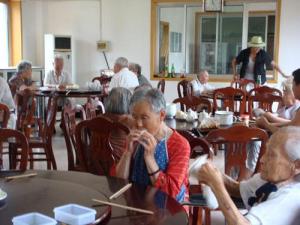Beijing to Assess Care Conditions of Elderly
November 11, 2013
 |
| Beijing is to establish an evaluation system to comprehensively analyze and evaluate elderly people's physiological, mental, economic and living conditions in order to provide necessary services. [news.sciencenet.cn] |
The Beijing Government recently issued the Suggestions on Promoting the Elderly-care Service Industry and measures to implement building elderly-care institutions.
It is to implement "the strategic goal of actively responding to the aging population and striving to develop elderly-care service work and industry" raised in the report delivered at the 18th National Congress of the Communist Party of China.
Li Hongbing, deputy director of the Beijing Bureau of Civil Affairs, said the Suggestions provided detailed explanations of the objects of the industry's services, the services to be provided and the basic level of the services. More detailed studies of methods of implementation will be carried out.
Li Hongbing said the assessment, as one part of the Suggestions, will define the quantifications of the elderly to care services and relevant subsidies.
After its implementation, the elderly who have low incomes, disabilities, no children, or who have special difficulties, will be provided with government welfare guarantees.
Wang Zhenyao, dean of the China Philanthropy Research Institute, Beijing Normal University, said it was a common practice internationally to assess the condition of the elderly population. Previously, China only assessed the elderly's economic conditions. But, many elders who have incomes higher than the standard also have no capacity for care.
Beijing vowed early this month to increase investment in nursing homes in a bid to take care of more elderly people in the city.
The city plans to provide more than 120,000 nursing home beds by 2015 and 160,000 by the end of 2020, to ensure that 40 beds are available for every thousand seniors.
Investment will be increased to expand nursing homes, providing 25,000 yuan ($4,000) for each bed, compared to 8,000 to 16,000 yuan in the past.
"The government needs to be fully aware of the urgency of dealing with the huge and increasing elderly population in the capital," said Li at a news conference last week.
"The government is also considering measures to attract more social capital for seniors' welfare and improve the quality of private elderly welfare institutes."
More than 95,000 beds are available in the capital's nursing homes so far.
Li said the capital is facing various problems concerning the welfare of the aging population, including inadequate financial support, a lack of beds in nursing homes and bed vacancies due to poor administration.
"There is a shortage of nearly 300,000 nursing home places for senior citizens across the city," he said.
More than 30,000 of the beds are publicly operated and the reainder are run by private enterprises, which are less professional, he said.
To cope with the dilemma, the government plans to provide more financial support to the institutes while attracting more social capital to help improve their quality.
(Source: beijing.qianlong.com/Translated and edited by womenofchina.cn)
Please understand that womenofchina.cn,a non-profit, information-communication website, cannot reach every writer before using articles and images. For copyright issues, please contact us by emailing: website@womenofchina.cn. The articles published and opinions expressed on this website represent the opinions of writers and are not necessarily shared by womenofchina.cn.

 京公网安备 11010102004314号
京公网安备 11010102004314号